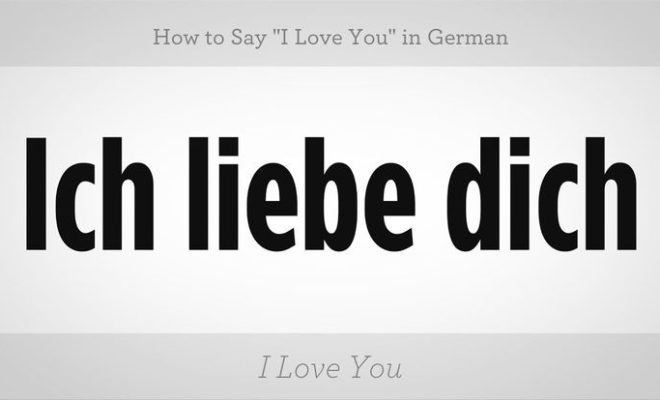How to Say I Love You in German: 8 Steps

Introduction:
Love is a universally shared emotion, and expressing it to someone special can be both rewarding and daunting, especially when you want to say it in another language. Learning how to say “I love you” in German can be a touching and heartfelt way to show your feelings towards your beloved. Here are eight simple steps to help you master this essential phrase in the German language.
Step 1: Learn the basic phrase
The most common way to say “I love you” in German is “Ich liebe Dich.” It is pronounced as “Ikh lee-beh Deekh.” Each word has its own significance:
– Ich (I) – It is pronounced like “Ikh.”
– liebe (love) – Pronounced as “lee-beh.”
– Dich (you) – It is said as “Deekh.”
Step 2: Begin with “Ich”
The first word in the phrase, “Ich,” stands for “I” in English. It is essential to use this word when expressing your love for someone in German. Practice pronouncing it with a short, sharp sound at the beginning, like clearing your throat.
Step 3: Learn the verb “liebe”
“liebe” means love and is the second word in the phrase. Its pronunciation can be tricky initially, but with some practice, it gets more comfortable. Ensure that you emphasize on ‘ee’ sound and roll your tongue slightly when pronouncing ‘b.’
Step 4: Master saying “Dich”
“Dich” means “you” and signifies the object of your affection. It is pronounced with the same soft throat-clearing sound as ‘Ich.’ The only difference is that it ends with kh sound as in ‘loch.’
Step 5: Practice saying the phrase together
Once you’ve mastered each individual word, practice saying the complete phrase “Ich liebe Dich” with a smooth, even flow of sound. Pause slightly between each word but don’t exaggerate the gaps.
Step 6: Add some flair
To make your declaration of love even more special, consider adding phrases like “sehr” (very) before “liebe” or “immer” (always) after “Dich.” For example, you can say, “Ich liebe Dich sehr” (I love you very much) or “Ich liebe Dich immer” (I will always love you).
Step 7: Understand formal and informal variations
In German, there is a formal and informal way of addressing people. When expressing your love to someone in a formal manner, consider using the word “Sie” instead of “Dich.” The phrase would then become “Ich liebe Sie.”
Step 8: Show your love through actions
While knowing how to say “I love you” in German is an essential skill, expressing your love through kind gestures and quality time together is just as important. Remember that actions often speak louder than words.
Conclusion:
With these eight steps, you can confidently express your love in German and share deep emotions with your special someone. Practice the phrases and pronunciation while ensuring genuine feelings behind them. Liebe knows no language barriers – geben Sie Ihre Liebe frei! (Love knows no language barriers – set your love free!)






